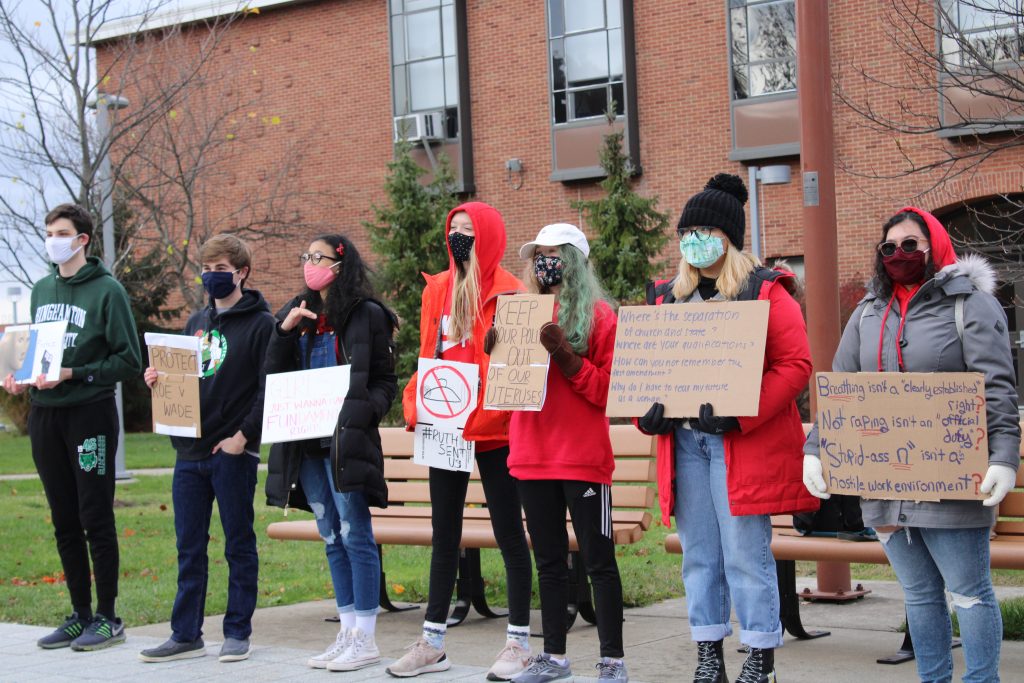Frigid winds did not stop students from lining Binghamton University’s Spine for “The ‘Wait What Am I Missing?’ Protest,” held in response to Amy Coney Barrett’s confirmation as a Supreme Court Associate Justice.
On Tuesday, about 10 students bundled up and occupied the Spine for hours to express their belief that Barrett’s appointment threatens reproductive rights in the United States. They held signs with different phrases, such as “Girls just wanna have fundamental rights” and “Grab Trump by the ballot.” All protesters wore masks and maintained social distance.
The protest’s flyer featured a figure clad in a red cloak and white bonnet, evocative of the characters in the Hulu series “The Handmaid’s Tale,” based on the book of the same title by Margaret Atwood. This image referenced the nationwide red cloak protests, where participants protested Barrett’s confirmation and brought awareness to women’s rights while dressed in red cloaks inspired by the dystopian story. Sasha Naunton, the organizer of the protest and an undeclared freshman, explained the connection between Barrett’s appointment and the novel.
“The inspiration for this protest really came from the red cloak protest that occurred on [Oct. 25] around the country,” Naunton said. “With women’s rights being stripped away, we’re one step closer to women just being there to have children and look after men.”
One of the protestors held a sign that read “#RuthSentUs,” a phrase used by the red cloak protest that references the late Ruth Bader Ginsburg, Barrett’s predecessor on the Supreme Court.
Barrett’s succession to the Supreme Court shifted the ratio of Republican-appointed justices to Democrat-appointed justices from 5-4 to 6-3. Manny King, one of the protesters and a sophomore majoring in psychology, explained that although the majority of Supreme Court Justices were appointed by Republican presidents prior to Barrett’s confirmation, Chief Justice John Roberts’ commitment to leaving his religious views out of his judicial rulings allowed for progressive rulings.
“That may not be the case now,” King said. “I’m not sure what may come of this, but I know that the five [Republican-appointed] judges, excluding Roberts, could potentially backtrack on a lot of issues that we’ve made in the past.”
For these protesters, Barrett’s appointment foreshadows a potential rollback of reproductive rights and access to health care. One of the organizers, Jackie Jergensen, an undeclared freshman, explained how future judicial rulings might impact these rights.
“It’s horrible to see how difficult it already is for people, especially women, to get the health care they need,” Jergensen said. “With [Barrett] now on the Supreme Court, Roe v. Wade and the Affordable Care Act are both seriously threatened.”
Additionally, the protesters expressed their doubts about whether Barrett’s confirmation was fair and whether she will make a competent Supreme Court Associate Justice. Naunton highlighted inconsistencies in the confirmation process.
“[President Trump] confirmed Judge Barrett only eight days before the election,” Naunton said. “Merrick Garland, President Obama’s nomination, couldn’t get a hearing 293 days before the election.”
King questioned whether Barrett is qualified to serve on the nation’s highest court.
“Most of her background experience is in education,” King said. “She’s never judged in a criminal trial.”
For some of the protestors, concerns about Barrett’s appointment extend beyond women’s rights. One of the protesters, Emily DePietro, an undeclared freshman, highlighted the widespread implications of Supreme Court decisions and questioned the legitimacy of Barrett’s beliefs.
“Her views affect everyone,” Depietro said. “She thinks environmental issues are a political issue. It’s a science issue, not a political issue.”
Brooke Bogart, protest organizer and an undeclared freshman, remained hopeful that, although the protest may not reverse Barrett’s appointment, staging the demonstration on Election Day will encourage students to consider women’s rights as they vote.
“I hope this protest will show people unaware about this issue to look more into it,” Bogart wrote in an email. “We are the next upcoming generation that can make a change in the world, and a big way we can do this is by voting in this election. And with the election being on the same day as this protest, I hope it gained support to vote for women’s rights and that our voices were heard.”
Naunton expressed the hope that the protest will serve as an inspiration to participants and passersby.
“I hope that participants will take away that they should fight for what they believe in,” Naunton said. “Change is possible. This protest was only organized a week before and with five students. This shows how easy it is to bring people together for a common cause and fight for what you believe in. The only way change will happen is if we stand up for what we believe in, so I hope the participants will continue to do so.”



